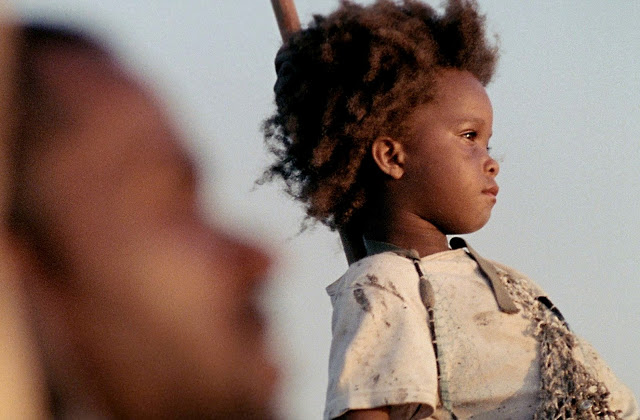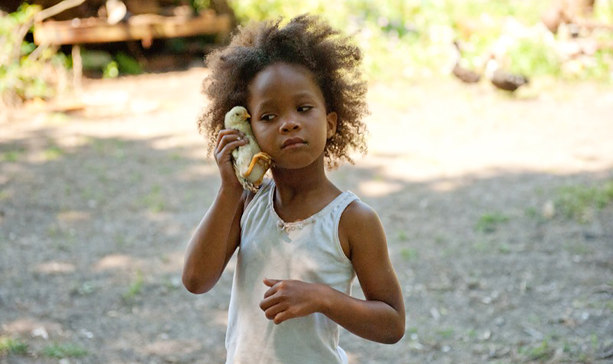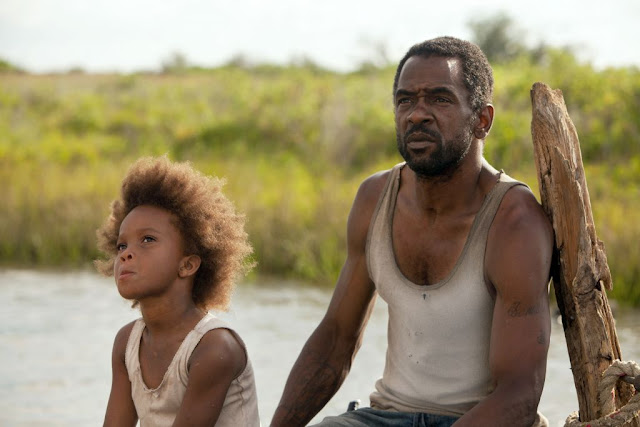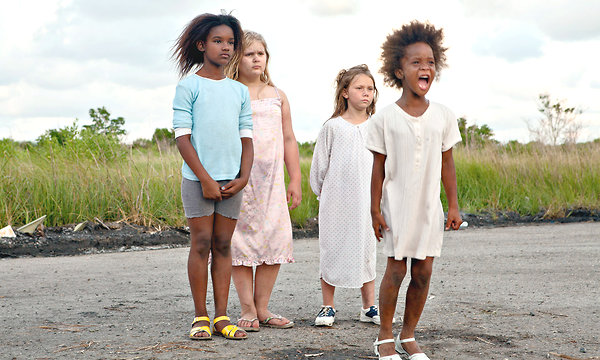I have a confession to make. I’m a big softie when it comes to movies. I shed tears at the drop of a hat. But I usually don’t cry during a film trailer. But Beasts of the Southern Wild — both the trailer and the film itself — made me weep.
A strange, haunting, breathtaking dystopian fantasy — it contends with polar ice caps melting, prehistoric creatures, lands flooding, and the bonds of family. With its lush scenes, poignant and complex characters, and achingly beautiful music, it stirred emotions and memories long forgotten. It’s a triumph of the human spirit. And the best part? At the bittersweet film’s center is a little girl.
The film’s female protagonist is Hushpuppy, a 6-year-old African American girl who lives with her father on an island called the Bathtub. And she is a breath of fresh air. Played with depth, nuance and sensitivity, newcomer Quvenzhané Wallis — who’s already generating lots of Oscar buzz — dazzles on-screen. Her luminous personality captivating you at every moment. She’s been called “a miniature force of nature.” And I couldn’t think of a more perfect description. It’s hard to believe Wallis was only 5 years old when she filmed the movie.
Hushpuppy is a pint-sized powerhouse. An indomitable survivor. She’s brave, tough and strong-willed. There’s a fierce intensity, and an old wisdom behind her eyes. Honest, vulnerable and sweet – she is the film’s moral compass, its anchor.
Too often with films with daughters, they merely exist so we can see how the parents react to them. But here, we witness the story unfold from Hushpuppy’s perspective. Director and co-screenwriter Benh Zeitlin said he made a conscious decision to only yield information Hushpuppy has access to. We the audience see only what she sees. She narrates the film throughout so we always know her thoughts and feelings. But honestly, even if you erased all the narration, you would still know because of Wallis’ expressive face and body language. Through her narration, we peek a glimpse into her psyche. Hushpuppy utters poetic and sage musings:
“When it all goes quiet behind my eyes, I see everything that made me flying around in invisible pieces… Everybody loses the thing that made them. The brave men stay and watch it happen. They don’t run.”
“I see that I am a little piece of a big, big universe, and that makes it right.”
Hushpuppy frequently lets out this little scream that reminds me of a warrior cry akin to Xena. It’s as if she’s declaring, “I’m here world. Deal with it.” She carries the weight of the world on her shoulders. Yet there’s a buoyancy to her spirit. Putting animals up to her ear so she can “listen to their innermost desires,” savoring each bite of food she eats…these bring her joyous rapture. Hushpuppy is the film’s moral compass and anchor. We see the whole world through her eyes.
While at times it looks the same, the world in Beasts of the Southern Wild is not ours. The Bathtub was inspired by the real Louisiana island Isle de Jean Charles, which is frequently flooded and is “cut off from the levee system.” Beneath the surface of this strange fantasy, it feels like an allegory of Hurricane Katrina. Although director and screenwriter Zeitlin insists the film is not about Katrina. An apocalyptic fantasy grounded in realism, Zeitlin discussed the film’s message:
“It’s a folk tale about the emotional experience of what it’s like to have to survive the end of your world, and to lose the things that made you.”
Despite his protestations, the parallels between Beasts of the Southern Wild and Hurricane Katrina are uncanny. The film contends with how to survive losing your home amongst horrific destruction and how we shouldn’t turn our back on people. Again feeling like a parallel to the way the government turned its back on Katrina survivors, particularly the survivors of color. The film also contains a strong message of environmentalism. If we continue down the same path of environmental degradation, we may destroy the planet. The philosophy that we are all connected reverberates throughout the film. Especially when Hushpuppy says:
“The whole universe depends on everything fitting together just right. If one piece busts, even the smallest piece…the entire universe will get busted.”
Beasts of the Southern Wild features a disturbing yet loving relationship between Hushpuppy and her ailing father Wink (Dwight Henry), an alcoholic, who vacillates between joyful hope and pained anger. In the beginning, he’s cold and cruel, alcohol warping his lucidity and judgment. He knows he has to take care of her and teach her how to survive in the world. But he seems to resent it as he can barely take care of himself. We eventually see his benevolent streak as he looks for survivors. By the end of the film, I broke down in silent sobs as we witness the strength of their bond.
Too often in film and TV, black fathers are absent, either dead or incarcerated. So it was great that here was a black father. And Henry imbued depth, anger, pain and hope into his character. But why did he have to be so broken? Why can’t we see a positive representation of a black father?
Like many fantasies and fairy tales, we witness an absent mother. But Hushpuppy’s mother’s presence is very much alive. Hushpuppy carries around a sports jersey, a symbol of her mother. She has imaginary conversations with her mother. When she sees a blinking beacon off on the horizon, she believes it’s her mother beckoning her. We also see a maternal figure in Miss Bathsheeba (Gina Montana) who nurtures and cares for all the children of the Bathtub. As her world begins to crumble, Hushpuppy eventually goes in search of her mother. In her journey, Hushpuppy traverses the land with three young girls at her side.
The film boasts strong, resilient, outspoken women and girls. And the stereotypically feminine trait of caretaking is lauded and celebrated. Miss Bathsheeba tells the children that they’ve got to take care for those “littler and sweeter than them…that’s the most important lesson I can teach you.” Wink believes it’s his duty and responsibility to teach his daughter how to survive and take care of herself. Screenwriter Lucy Alibar said he ultimately teaches Hushpuppy:
“How to take care of people. How to take care of someone weaker than you. The strength of kindness. The strength of standing with some place, with your family.”
Sadly, through gendered language, the feminine is often denigrated and demeaned at worst and diminished at best.
Wink often says “man” to Hushpuppy, like “Hey, man.” When they arm wrestle he asks her, “Who’s the man?” To which she proudly replies, “I’m the man.” When Hushpuppy’s house is destroyed – yes, her and her father each have their own house with their own belongings – he draws a line separating Hushpuppy from his sphere, the masculine one. He tells her that no girly toys are allowed on his side, but that he can’t hit her on her own side, something in her favor (Um, what?? Yeah, I’m not cool with violence). Wink often tells Hushpuppy, “No crying,” not allowing her emotions that depict weakness in his eyes. Even when we’re introduced to Miss Bathsheeba (Gina Watson), she’s telling the children not to be “pussies,” something uttered by Hushpuppy herself later in the film.
Food plays an integral role in the film, as sustenance, as a part of culture and as celebration. You see Hushpuppy, her father and their community eating seafood. While it was difficult for me to watch as a vegan, the feminist in me was thrilled that we see a girl eat. In reality, women and girls obviously eat. Due to the media’s policing of female bodies, women and girls have an antagonistic relationship to food. We don’t typically see female characters eating on-screen.
We also see a subtle commentary on gender performance and gender norms. When the residents of the Bathtub are transported to the mainland by the government, Hushpuppy is forced to wear a frilly, girlie-girl dress and tame her wild hair. Stripped of her identity and forced into conformity, she looks miserable. She doesn’t want to be constrained in gender stereotypes. Unconsciously, she wants to perform gender on her terms, not society’s.
I often lament the lack of female-centric films, particularly with women and girls of color. When we do see women, they usually appear as sidekicks or love interests to men. But not here. A black girl is front and center. And even though the film focuses on Hushpuppy’s relationship with her father, her relationship with her mother is equally as important.
We often see boys and men in films that showcase a hero’s journey or transformation. But here – in this film showcasing a triumph of the spirit – we see a journey with a strong-willed, opinionated girl of color. And I couldn’t be more thrilled.
Mystical, ethereal, surreal, touching – Beasts of the Southern Wild is all of these and yet so much more. Even as you watch the film, you might not understand or fully comprehend the meaning of the unusual plot. But let its poetic beauty, emotions and raw honesty wash over you. Let it sink in. For it will be a long time before another film like it – or another female hero as complex as Hushpuppy – comes our way.






great review. i agree: we need more positive images of black fathers in film.
Sounds interesting, will definitely try to watch it. But don’t you wonder whether a father would be just as indulgent when after a girl reaches puberty, in my memory a wonderful little-girl world full of adventure tends to crumble as soon as one them grows those dreaded breasts and become pregnancy prone. To continue to treat her with open love and affection even after that is the true test, either he turns into a typical overprotective patriarchal pain in the butt, or accepts her biology and continues to treat her like full fledged human being. I’d like to see that happening also.
I never saw the trailer but did rent the dvd not really knowing much about it. I started crying before the title flashed on the screen and pretty much sobbed all the way through, even past the credits. I lived through Katrina and lost my own father to an infection in his lungs that was caused by the conditions during the hurricane’s aftermath- so this movie hits very close to home for me in more ways than one. That said, I am not African American but didn’t need to be to put myself right there in Hushpuppy’s shoes. Call me crazy but I didn’t see Wink as anything but a positive father image. Do parental images have to be as perfect as the Huxtables to be positive? Can’t we learn from their mistakes as well as all the things they do right?